
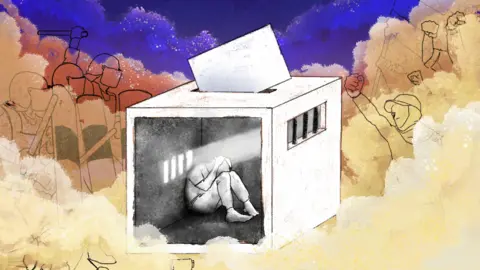 Daniel Arce Lopez/BBC
Daniel Arce Lopez/BBC“They have already tortured and oppressed me, but they will not silence me. My voice is the only thing I have left.”
This is how Juan, a young man of about 20, begins his story. He is alleged to have been subjected to physical and psychological torture by Venezuelan security forces after his arrest in connection with the presidential elections on 28 July.
He was one of hundreds of people arrested during the protests after electoral authorities – dominated by government loyalists – declared incumbent President Nicolas Maduro the winner.
The National Elections Council did not announce the results of the vote, and the Venezuelan opposition described the official result as fraudulent, noting that the voting results it obtained with the help of election observers indicated an overwhelming victory for its candidate. Edmundo Gonzalez.
Juan was released from prison in mid-November, days after Maduro called on judicial authorities to “correct” any injustice in the arrests.
The BBC spoke to him via video call. For his safety, we decided to withhold some details of his case and changed his name.
The young man claims that many detainees are subjected to ill-treatment, as they are served “rotten food” and that the most rebellious are locked in “torture rooms.”
He showed the BBC documents and evidence confirming his story, which coincided with other testimonies and complaints from NGOs.
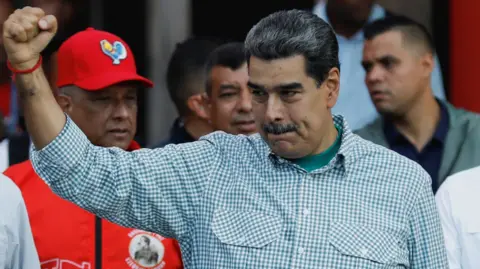 Reuters
ReutersJuan, an anti-government political activist, says the campaign and days leading up to the election were “marked with hope” and many people were keen to vote for change.
But the announcement of Maduro's victory shortly after midnight on Sunday turned what for many was a celebratory mood into confusion and anger.
Thousands of Venezuelans took to the streets to protest the result, which they described as fraudulent.
The opposition and international organizations say that what followed was police repression that led to the killing of more than 20 demonstrators.
Maduro and some of his officials, in turn, blamed the opposition and “far-right” and “terrorist” groups for their deaths.
Gonzalo Himiob, of the Venezuelan NGO Foro Penal, says people have been arrested simply for “celebrating the opposition's announcement of Edmundo González's victory, or for posting something on social media.”
“We also have cases of people who weren't even protesting, but for some reason they were near a protest and they were arrested,” he added.
Juan says this is what happened to him.
“I felt like I was in a concentration camp”
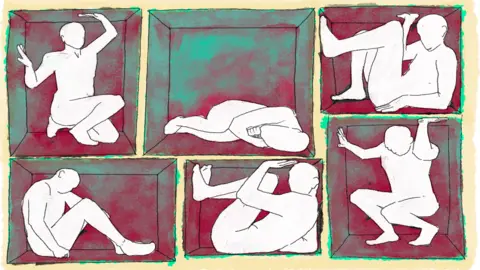 Daniel Arce Lopez/BBC
Daniel Arce Lopez/BBCThe young political activist says that he was carrying out a mission when a group of masked men intercepted him, covered his face, beat him, and accused him of being a terrorist.
He continued: “They put Molotov cocktails and gasoline on me, then took me to a detention center.”
He was held in a prison inside Venezuela for several weeks until he was transferred to Tocorón, a notorious high-security prison located about 140 kilometers southwest of the capital, Caracas.
There he will go through what he described as the worst experience of his life.
“When we arrived in Tocorón, they stripped us, beat us, and insulted us,” Juan recounts. “We were forbidden from raising our heads and looking at the guards; we had to lower our heads to the ground.”
Juan was allocated a small cell measuring three meters by three metres, which he had to share with five other people.
There were six beds arranged in three bunk beds, and in one corner was a septic tank and a “pipe used as a shower.” This was the bathroom.
“In Tocoron, I felt more like a concentration camp than a prison,” the young man says. He describes the beds as “concrete tombs” with very thin mattresses.
He explains: “They tortured us physically and psychologically. They did not allow us to sleep, and they always came to ask us to stand up and line up.”
“They would wake us up around 05:00 to line up behind the cell. The guards would ask us to show our cards and numbers.”
He adds that at around 06:00 they would turn on the water for six minutes so they could shower.
“Six minutes for six people and only one very cold shower. If you're the last person there and don't have time to remove the soap, you'll be left covered in soap for the rest of the day.” He says.
He adds that they then waited for breakfast, which sometimes arrived at 06:00 and sometimes at 12:00.
Dinner was sometimes at 21:00 and sometimes at 02:00.
“Except waiting for meals, there was nothing else to do. We could only walk around inside the small cell and tell stories. We also talked about politics, but in low voices, because if we heard the guards, they would punish us.”
“I thought I was going to die”
Juan says many of his fellow prisoners were depressed and acting like zombies.
“They gave us spoiled food – leftover meat like chicken, dog or sardines that had already expired.”
He says some detainees were routinely beaten or forced to “walk like frogs” with their hands on their ankles.
He describes “punishment cells” where the most rebellious people are sent, or those who dare to talk about politics or ask to make a phone call to their relatives.
Juan says he was in a punishment cell in Tocoron and received only one meal every two days.
“It was a very dark cell, one meter by one meter,” he says. “I was very hungry. What kept me going was thinking about all the injustice that was happening, and that one day I would get out of there.”
Another torture cell is known as “Adolfo's Bed,” after the first person to die there, Juan says.
“It's a dark, oxygen-deprived room, the size of a basement. They put you in there for a few minutes until you can't breathe, and you faint, or you start banging on the door in despair. They put me in there and I keep going.” He remembers just over five minutes.
Reports of crimes against humanity
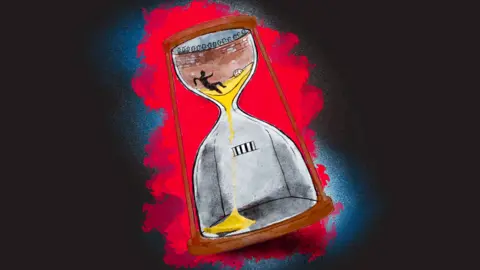 Daniel Arce Lopez/BBC
Daniel Arce Lopez/BBCThe young man says that in this prison, inmates have 10 minutes to exercise outside three times a week, but many of them remain in their cells.
Gonzalo Himiope of Foro Penal calls conditions in Tocoron “deplorable” and says detainees' basic rights, such as the right to contact a lawyer of the detainee's choice, are being violated.
“They all have public defenders — the government knows that if they allow access to a private attorney who is not a public employee, he can document all the due process violations that are occurring.”
In October, UN experts reported serious human rights violations in the run-up to the presidential elections and during the protests that followed, including political persecution, excessive use of force, enforced disappearances and extrajudicial executions by state security forces And security forces. Relevant civic groups.
The International Criminal Court is currently investigating the Venezuelan government for possible crimes against humanity.
The Venezuelan government denies these accusations and says this investigation “responds to the intention to use international criminal justice mechanisms for political purposes.”
The BBC requested an interview with the Attorney General's Office about allegations of ill-treatment and torture of detainees, but had not received a response at the time of publication.
“I'm no longer afraid of the government”
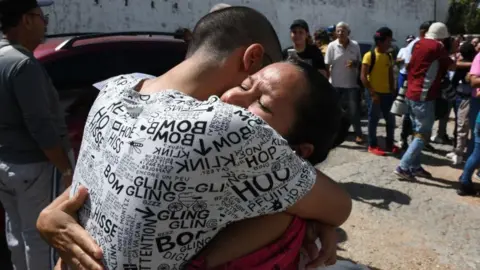 Getty Images
Getty ImagesJuan was released in November, but according to Foro Pinal figures, there were still 1,794 political prisoners in Venezuela as of December 30.
According to Juan, many of the detainees in Tocoron pinned their hopes on one date: the presidential inauguration on January 10, 2025.
It's the day opposition candidate Edmundo Gonzalez, who lives in exile in Spain, announced he would return to Venezuela and take office as president.
He is basing his claim for the presidency on the official voting results that the opposition was able to collect with the help of election observers.
Those statistics, which amount to 85% of the total, were uploaded to a website and reviewed by independent observers who say they point to a landslide victory for Gonzalez.
On Tuesday, US President Joe Biden met with Gonzalez and described him as the “real winner” of the Venezuelan elections.
However, it is not clear how Gonzalez, for whom authorities have issued an arrest warrant, plans to enter Venezuela or who will swear him in given that Maduro loyalists dominate the National Assembly.
However, Juan says the prisoners detained in Tocoron are hoping against hope that Friday will see a change in government and their release from prison.
Meanwhile, Maduro's government has described any talk of a political transition as a “conspiracy” and threatened that anyone who supports a change of leader “will pay a price for it.”
Juan admits that he feels a certain sense of guilt for being free while hundreds of his “comrades are still suffering” in prison.
But he says he is determined to return to the streets to show his support for Edmundo Gonzalez on January 10.
“I no longer fear the Venezuelan government,” he explains.
“They have already accused me of committing the most heinous crimes, such as terrorism, even though I am just a young man who did nothing more than love his country and help those around him.”
“I'm not afraid,” Juan repeats, before admitting that he left some written testimonies in a safe place “in case something happens to me.”
Illustrations by Daniel Arce Lopez.








